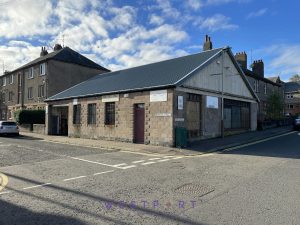Investing in real estate remains one of the most reliable ways for landlords to build long-term wealth. However, deciding between residential and commercial property can be a turning point, especially for those exploring the diverse property market. Each option brings its own responsibilities, risks, returns, and management needs.
As a landlord, you might focus on earning steady income through rental properties or explore higher returns with commercial investments. Either way, your choice should align with your financial goals, risk tolerance, and how much time and effort you’re willing to put into managing your portfolio.
In this guide, I’ll break down the key differences between residential and commercial real estate from a landlord’s perspective. From rental income and lease agreement terms to financing, risks, and day-to-day management, you’ll get a clearer picture of which property type is the right fit for your investment strategy.
What Is Residential Property?
Residential property refers to real estate that provides living spaces for individuals or families. This includes single-family homes, apartments, condominiums, townhouses, vacation rentals, and small multifamily buildings (typically up to four units). Unlike commercial or industrial properties, which are used for business purposes, residential properties are designed to serve as homes.
For many first-time investors, residential real estate is a safe and easy way to get started in the property market, even during economic fluctuations, providing consistent rental income. Since December 1, 2017, all new residential rentals in Scotland must use the Private Residential Tenancy (PRT), which has no fixed lease term and continues until either the landlord or tenant gives proper notice to end it. Older agreements, such as assured or short assured tenancies that started before this date, remain valid under their original terms. The PRT system gives landlords flexibility to manage tenants, adjust rent, or update lease terms, making residential properties a manageable and dependable investment.
What Is Commercial Property?
Commercial properties refer to properties used for business purposes, including office buildings, retail spaces (such as malls, shops, and restaurants), industrial units (like warehouses and factories), and multifamily apartment buildings with five or more units (which are considered commercial in many areas). Additionally, investors classify mixed-use properties and data centers as commercial real estate.
Unlike residential properties, commercial real estate(CRE) is often favored by experienced investors due to the potential for higher rental income, longer leases (typically ranging from 3 to 10 years), and greater scalability. In commercial properties, tenants are usually businesses rather than individuals, which can offer more stability and longer-term commitments compared to the shorter, more frequent turnover of residential tenants.
Key Differences Between Residential and Commercial Property
| Feature | Residential Properties | Commercial Properties |
| Purpose | Living space | Business activities |
| Lease Terms | Residential leases (No fixed end date) | Commercial leases (3-10 years) |
| Tenants | Residential tenants | Commercial tenants (businesses) |
| Return | Lower but steadier | Potentially higher but riskier |
| Management | DIY or part-time flexibility to handle day-to-day operations. | Often requires property managers |
| Regulations | Governed by local housing codes | Stricter health and safety regulations, property law, and zoning laws |
| Entry Cost | lower investment and maintenance costs | Requires substantial capital and larger down payments |
| Vacancy Risk | Lower risk due to steady demand. | Subject to longer vacancy periods |
| Financing | Easier via traditional mortgages | Stricter terms, higher initial investment compared to residential |
1. Property Management
- Commercial: As a landlord, managing commercial property can be a lot more complex than it seems at first. If you’re looking to rent a commercial property for the first time, lease negotiations usually involve lawyers, which means legal fees and lengthy, detailed contracts. You must also comply with stricter safety regulations and codes. That’s why many commercial landlords choose to hire estate agents or professional property managers to handle tenant sourcing, ongoing maintenance, and all the legal compliance, which can be overwhelming on your own.
- Residential: On the other hand, investing in residential property usually needs more personal involvement, and that’s okay. Many landlords prefer to manage these properties themselves. The rental agreements are simple, the housing rules are easier to follow, and overall, it’s a good and manageable way for new landlords to get started and stay involved.
2. Rental Income and Yields
- Residential: Residential rentals typically generate lower rental income per unit, and the shorter lease terms often lead to more frequent tenant turnover, which means more effort in finding new tenants and managing vacancies. However, one advantage comes from the stable demand, even during economic downturns, as people always need a place to live. On average, the rental yield for residential properties tends to fall around 3% to 6%, making it a steady, if modest, income stream for landlords.
- Commercial: Business properties often generate higher rental income, typically ranging from 6% to 12%. Longer leasing terms provide steady, predictable cash flow, and with tenants covering expenses like taxes, insurance, and utilities, landlords can reduce their ongoing costs. While these investments require a larger upfront commitment, they can be highly profitable when managed well.
3. Tenant Stability and Lease Terms
- Residential: Tenants in this sector are usually individuals or families, and the leases tend to be short-term, which often results in frequent turnover. As the landlord, you’re typically responsible for most of the maintenance and day-to-day upkeep, making this type of investment more hands-on. It’s a common scenario for landlords managing single-family homes or small multifamily units, especially in the early stages of their property journey.
- Commercial: Commercial tenants are usually businesses that sign long-term leases, giving landlords steady income. Many leases include rent increases based on property market trends, so your earnings can grow over time. With Triple Net (NNN) leases, tenants often cover maintenance, insurance, and taxes, which reduces your workload as a landlord.
4. Market Dynamics
- Residential: Residential real estate generally holds its value during downturns. As people always need housing, demand for rental properties often grows in recessions.
- Commercial: The commercial property sector, on the other hand, is sensitive to economic changes. Shifts in retail habits, hybrid working models, or local business closures can affect demand for office or retail spaces. Understanding these trends is key before investing in commercial and residential property.
5. Capital Appreciation
- Residential: In the residential market, property value is largely driven by location, supply, and demand. Homes in desirable areas usually maintain or steadily increase in value. One of the key advantages for landlords is easier resale and greater liquidity, making it simpler to exit an investment when needed. Over time, residential properties generally experience steady appreciation, offering long-term value growth alongside rental income.
- Commercial: On the other hand, the value of commercial property is often influenced by rental income and the success of the businesses operating within the space. In high-growth or booming areas, these properties can appreciate more rapidly, especially when tenant businesses thrive. However, one challenge landlords may face is lower market liquidity, with fewer buyers and a more niche investor pool, selling commercial property can take longer compared to residential real estate.
6. Financing and Entry Costs
- Residential: In residential real estate is easier to get into mortgages, especially for first-time buyers. Lenders often offer lower down payment options, typically ranging from 3% to 20%, making it more financially accessible. This lower barrier to entry makes residential property a popular choice for beginners looking to start their real estate journey.
- Commercial: Financing a commercial property usually involves a higher down payment, typically between 20% and 35%, along with a strong financial background. Lenders set stricter criteria for commercial mortgages, making the approval process more demanding. Because of this, commercial loans often favor investors with prior property management experience and solid financial credentials, making them less accessible for beginners.
7. Risk and Volatility
- Residential: Investing in residential real estate comes with challenges like vacancy periods and frequent tenant turnover, which can affect cash flow. Landlords also need to manage utilities and comply with regulations such as rent control, which can limit rent increases. On the plus side, residential properties are generally more stable during economic downturns, since people always need a place to live.
- Commercial: The commercial sector can be more unpredictable. When business tenants close or move out, vacancies may last longer, and economic slowdowns can hit occupancy harder. That’s why many investors work with estate agents or property managers who understand local market trends and tenant behavior.”
8. Tax Benefits and Depreciation
- Residential: You can take advantage of several tax incentives that help reduce overall taxable income. These include mortgage interest deductions, the ability to claim property depreciation over 27.5 years, and write-offs for repairs and maintenance costs. Together, these deductions can significantly ease the financial responsibilities of owning and managing rental property.
- Commercial: Commercial real estate also offers several valuable tax advantages for landlords. Depreciation is typically spread over 39 years for buildings and 5 to 15 years for improvements like equipment or structural upgrades. Landlords can also claim larger deductions for capital improvements, which can significantly offset taxable income.
Additionally, commercial properties are eligible for 1031 exchanges, allowing investors to defer capital gains taxes when selling one property and purchasing another. Because business activities take place on the premises, commercial real estate often qualifies for more extensive write-offs, making it an attractive option for tax planning.
Residential Property Investment: What Are Its Pros and Cons?
Investing in residential real estate is a popular way to generate passive income and build wealth. However, it comes with both benefits and challenges. Whether you’re new to investing or experienced, knowing the pros and cons can help you make informed decisions.
Pros:
- Steady income: Residential units often provide more consistent cash flow because people always need a place to live.
- Lower entry barrier: It’s easier to get started with residential properties since they typically require less capital than commercial properties.
- Simpler financing: Banks are more likely to offer loans for residential properties, making it easier to secure financing.
- Easier resale: Demand is high for primary residence homes, so selling a residential property tends to be simpler.
- Tax incentives: As a property owner, you can benefit from things like mortgage interest deductions and depreciation.
Cons:
- Tenant turnover: Residential leases are usually shorter, which means you may face more frequent tenant turnover.
- Managing maintenance: As the property owner, you’re typically responsible for maintaining the property and handling any repairs.
- Limited scalability: Growing your property portfolio can take longer with residential properties, especially if you’re relying on personal financing.
Commercial Property Investments: What Are Its Pros and Cons?
When it comes to commercial property investment, there are a few key pros and cons to keep in mind before diving in. Whether you’re considering office buildings, retail spaces, or industrial warehouses, understanding these factors can guide you in making smarter investment decisions.
Pros:
- Higher rental income: Well-located commercial buildings tend to generate higher rental income compared to residential properties.
- Longer leases: Commercial leases are typically longer, which means less tenant turnover and more predictable income.
- Tenant responsibility for maintenance: With triple net leases, tenants often take care of maintenance, saving you time and money.
- Potential for more tax incentives: Commercial properties may come with additional tax benefits, offering more opportunities for deductions.
Cons:
- Higher risks: Commercial properties are more sensitive to market dynamics and economic shifts, making them riskier investments.
- Higher initial investment: These properties usually require a larger upfront investment, including higher down payments.
- Stricter zoning laws: Commercial properties face more regulatory challenges, such as zoning restrictions and complex permits.
- Harder to find replacement tenants: Tenant turnover can be longer, and finding new tenants might take more time.
- Professional management needed: Managing a commercial property often requires professional help, adding to the cost and complexity.
Related: Should I Diversify My Portfolio by Investing in Commercial Property?
Final Verdict: Which Is Better for Your Investment?
In the end, choosing between residential and commercial property investment depends on your financial situation, risk appetite, and long-term goals. Residential properties are generally more suitable for beginners seeking lower risk and steady income, while commercial properties can offer higher returns for experienced investors who are comfortable managing complex leases and regulations.
Regardless of which type of investment you pursue, it’s important to understand lease agreements, evaluate market trends, consider the tax implications, and stay informed about safety regulations and property laws. With clear goals, thorough research, and the right professional guidance, you can build a successful and rewarding real estate portfolio in any market.
If you want professional support to make your property investments easier and more rewarding, Westport Property can help. We guide landlords through every step from managing residential rentals to commercial spaces, so you can focus on growing your investments. Get in touch with us today and take the next step with confidence.
Have A Question or Need Some Help?
Whether you're searching for the perfect rental property or a landlord wanting advice on letting, we're here to assist. Feel free to call our office or send us an email, and we'll be happy to help you with any queries you may have.
FAQs: Residential vs. Commercial Property Investment
1. Can I start with residential and later invest in commercial property?
Yes, many investors begin with residential properties to build experience and capital, then transition into commercial real estate for greater returns.
2. Are the tax implications different for residential and commercial properties?
Tax laws vary between the two, including depreciation schedules, deductions, and capital gains treatment. It’s best to consult a tax advisor familiar with real estate.
3. Can I change a residential property to commercial use?
Yes, but it involves applying for rezoning or a variance through local authorities. You may also need to upgrade the property to meet commercial building codes and accessibility requirements.
4. What are mixed-use properties?
Mixed-use properties combine residential and commercial elements in a single building or development—for example, retail shops on the ground floor with apartments above. These can offer diversified income and are increasingly popular in urban settings.
5. What is the main difference between residential and commercial property investment?
Residential properties are used for housing and include apartments, single-family homes, and condos. Commercial properties are used for business purposes and include office buildings, retail spaces, and warehouses.
What is the difference between residential and commercial tenants?
Residential tenants are usually individuals or families, with shorter leases and landlord-managed maintenance and utilities. Commercial tenants are businesses, often on longer leases, and may pay for taxes, insurance, maintenance, and utilities themselves, providing more predictable income but sometimes requiring professional management.
Is a block of flats a commercial property?
It depends on size. Small buildings with up to four units are generally residential. Blocks with five or more units are often classified as commercial, especially if treated as income-generating business assets or include mixed-use spaces.
What is the difference between commercial and residential property valuation?
Residential valuation focuses on location, condition, and comparable sales. Commercial valuation emphasizes income potential, lease terms, tenant quality, and cash flow, as these properties are primarily viewed as business investments.



 Find a Property Sale/Rent
Find a Property Sale/Rent  Letting Agents
Letting Agents  Asset Management
Asset Management 






